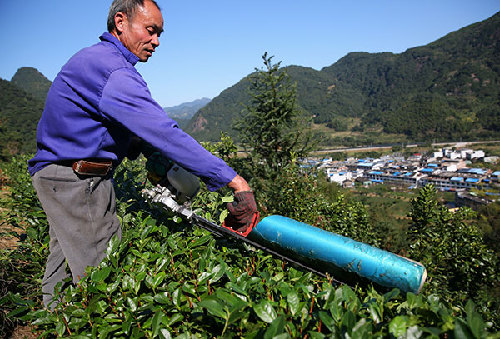Eliminating poverty a tough challenge for govt
( China Daily )
Updated: 2015-11-28

A farmer prunes tea plants in Chixi village in Fujian province on Thursday. The village is known for its great achievements in shaking off poverty.[WANG SHEN/XINHUA]
President stresses no ethnic groups or regions should be left behind in national campaign
 |
|
A farmer prunes tea plants in Chixi village in Fujian province on Thursday. The village is known for its great achievements in shaking off poverty.[WANG SHEN/XINHUA] |
The central government opened a meeting on Friday morning to discuss how it can lift 70 million people out of poverty by the end of 2020.
China plans to help all its remaining poor escape poverty in the next five years, a challenge identified by President Xi Jinping as the toughest for the government in achieving its aim of building a "moderately prosperous society" in this time frame.
No ethnic groups nor regions should be left behind in poverty alleviation, Xi said early this year.
Xi has attached great attention to poverty alleviation of the She ethnic group in Fujian province, where he worked from 1985 to 2002.
Xi paid many visits to She people's homes, mostly in the mountainous villages in Ningde. Fujian is home to about 365,500 She people, more than half of the country's She population.
Xi ensured that projects to improve infrastructure such as roads and electricity would be launched to help connect those villages with the outside world, while encouraging locals to develop specialty crops, such as grapes and tea.
When the villages were prone to disasters, Xi suggested relocation. He also made sure support for education for the villages was in place as a major effort of poverty alleviation.
Zhong Jinjin, a villager from Dongshan, home to mostly She people in Fu'an city, still remembered in 1999 when Xi, then deputy Party chief of Fujian, paid a visit to the village.
"He asked me how much a villager could earn each year," said Zhong, who then worked as an accountant in the village office. "I remembered clearly that at that time, each villager received between 900 yuan ($140) and 1,000 yuan."
The national average of villager's annual income was 2,162 yuan.
Zhong said he had observed that Xi had listened to his report intensively. In the end, Xi encouraged Zhong to find ways to build a better life.
"'You're still young. Try your best and you'll soon embark on the road to prosperity,' he told me," Zhong recalled. He was then 33.
Encouraged and inspired, Zhong set out to start a transportation business, which has prospered as logistics takes off across the country.
Zhong now earns over 150,000 yuan a year.
Zhong is not the only one inspired. In 2014, the average annual income of a villager in Dongshan reached 12,000 yuan, in comparison with the national average of 9,892 yuan.
By 2020, China will lift 50 million people out of poverty through support for industry, education, employment and healthcare, according to a statement issued after a meeting of the Political Bureau of the Communist Party of China Central Committee on Monday.
Dibao, a program guaranteeing subsistence, will cover the remaining 20 million poor who are unfit to work, and they will receive financial aid to ensure they live above the poverty line.
Xinhua and Fujian Daily contributed to this story.






